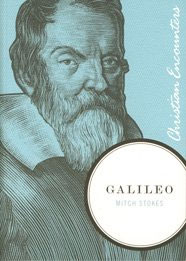What You Didn’t Know about Galileo
by Mitch Stokes. Available from Canon Press.
 In 1633, the Inquisition found Galileo guilty of “vehement suspicion of heresy” for his support of Copernicanism, the view that the earth moves around a stationary sun. The ill and elderly scientist was then forced to recant his view and spend the rest of his life under house arrest. He died in his country villa in 1642, entirely blind.
In 1633, the Inquisition found Galileo guilty of “vehement suspicion of heresy” for his support of Copernicanism, the view that the earth moves around a stationary sun. The ill and elderly scientist was then forced to recant his view and spend the rest of his life under house arrest. He died in his country villa in 1642, entirely blind.
The “Galileo affair” is the most familiar piece of evidence for the idea that science and religion have been at war from the beginning. But before signing on to this ‘warfare’ view, you should know something about Galileo’s life. Facts are important.
Perhaps most importantly, Galileo was a devout Catholic. In fact, at the end of his life, he wrote to a friend that his troubles weren’t nearly as bad as everyone believed. After all, he explained, he had the comfort of knowing that—before God—no one had more zeal for the Church.
So the debate over Copernicanism—this is another thing you should know—was between Christians, not between science and religion. It was an intramural debate over the nature of scientific evidence.
And when it came to that evidence, both sides held the same high standard. It’s just that Galileo’s evidence for Copernicanism didn’t meet that standard. In fact, Galileo’s best argument for Copernicanism was entirely wrong. In rejecting Copernicanism, the Catholic Church stood on fairly solid scientific ground. Of course, it was also apparent that the Bible said some relevant things about the sun. And, thankfully, Galileo was keen on the Bible. He professed that “the Holy Scripture can never lie or err, and it’s declarations are absolutely and inviolably true.”
And despite the condemnation of Copernicanism, the pope gave Galileo permission to write about the controversial view. Nevertheless, even after receiving the church’s official approval of the finished work, Galileo was put on trial for writing it. In the end, the entire ordeal was the result of a web of tragic misunderstandings and the pope’s hurt feelings. (You should never hurt the pope’s feelings.)
Despite these and other details—and largely because of two nineteenth century revisionist histories written by unbelievers—many people think that the trouble was, at root, between science and religion. And so a Christian scientist, it is believed, is like a square circle—impossibly inconsistent.
Don’t tell Galileo that.


























May 8th, 2011 at 2:05 am
Calvin and the other magisterial reformers opposed Galileo too. The Catholic church was right to oppose him on the evidence he presented. Nevertheless, they had a Docetic view of Scripture: as if God had dictated in a way that overwrote the human authors. As Sproul says, to this very day we still say “sunrise” and “sunset”, despite our high scientific knowledge. Science is only possible if we presume a rational God maintaining a rational universe.
May 9th, 2011 at 9:22 am
Interesting.